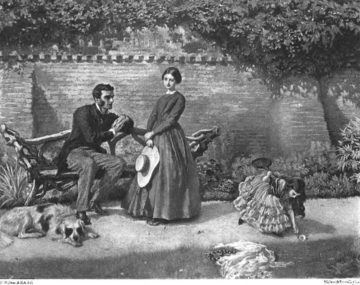Vanessa Zoltan in The Paris Review:
 The summer that I did my chaplaincy internship was a wildly full twelve weeks. I was thirty-two years old and living in the haze of the end of an engagement as I walked the hospital corridors carrying around my Bible and visiting patients. “Hi, I’m Vanessa. I’m from the spiritual care department. How are you today?” It was a surreal summer full of new experiences hitting like a tsunami: you saw them coming but that didn’t mean you could outrun them. But the thing that never felt weird was that the Bible I carried around with me as I went to visit patient after patient, that I turned to in the guest room at David and Suzanne’s or on my parents’ couch to sustain me, was a nineteenth-century gothic Romance novel. The Bible I carried around that busy summer was Charlotte Brontë’s Jane Eyre.
The summer that I did my chaplaincy internship was a wildly full twelve weeks. I was thirty-two years old and living in the haze of the end of an engagement as I walked the hospital corridors carrying around my Bible and visiting patients. “Hi, I’m Vanessa. I’m from the spiritual care department. How are you today?” It was a surreal summer full of new experiences hitting like a tsunami: you saw them coming but that didn’t mean you could outrun them. But the thing that never felt weird was that the Bible I carried around with me as I went to visit patient after patient, that I turned to in the guest room at David and Suzanne’s or on my parents’ couch to sustain me, was a nineteenth-century gothic Romance novel. The Bible I carried around that busy summer was Charlotte Brontë’s Jane Eyre.
I love the idea of sacredness. I want to be called to bigger things, outside of myself. I don’t want my life to be a matter of distractions from death and then death. I want to surprise myself and to honor the ways in which the world surprises me. I want to connect deeply to others, to the earth, and to myself. I want to help heal that which is broken in us. Which is why I went to divinity school at thirty years old. But God, God-language, the Bible, the church—none of it is for me. And halfway through divinity school, I realized that my resistance to traditional religion was never going to change. I wanted to learn how to pray, how to reflect and be vulnerable. And I didn’t think that the fact that I didn’t believe in God or the Bible should hold me back.
I, like many of us, have such complicated feelings about the Bible that it’s distracting to even try to pray with it. Too many caveats feel necessary to even begin to try. So I asked my favorite professor, Stephanie Paulsell, if she would spend a semester teaching me how to pray with Jane Eyre. Throughout the semester, we homed in on what I was searching for, a way to treat things as sacred, things that were not usually considered to be divinely inspired. The plan was that each week I would pull out passages from the novel and reflect on them as prayers, preparing papers that explored the prayers in depth. Then, together, we would pray using the passages.
More here.
